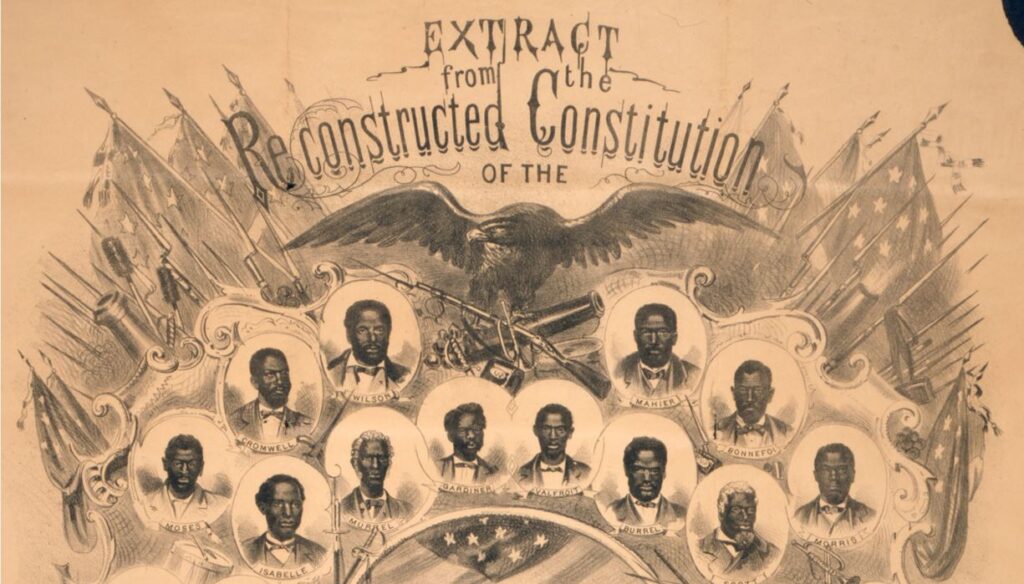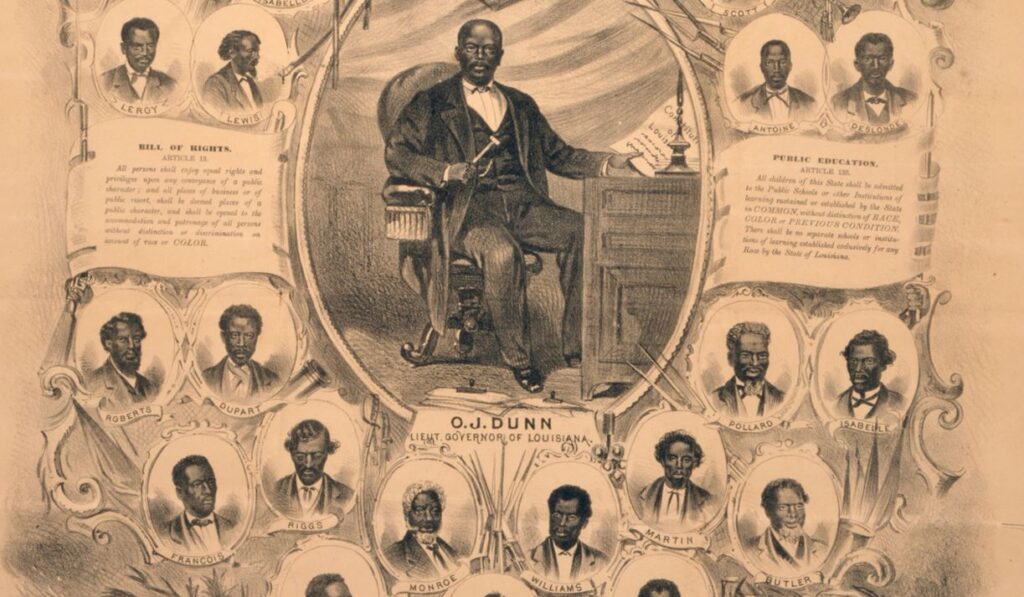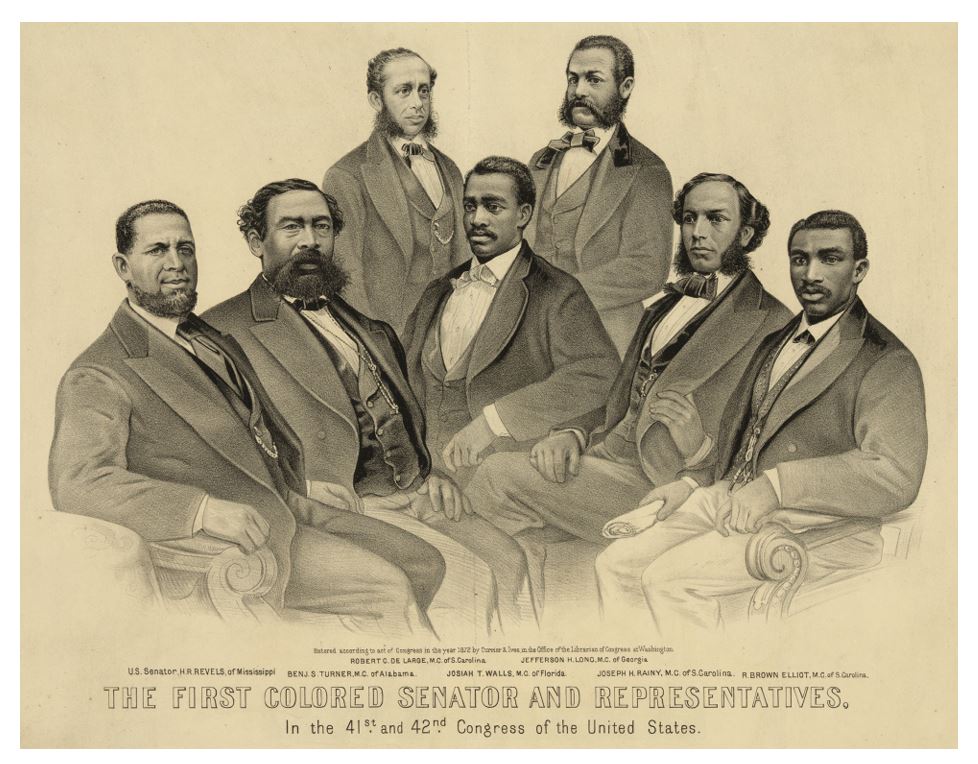The Colfax Trial and William Ward
February 1874
William Ward was a former slave and a veteran of the Union Army. He was also the acknowledged black political leader of the parish, a state representative 1872-1874 and captain of a state militia company. He was also in the Louisiana legislature as a Republican representative from 1872-1876.
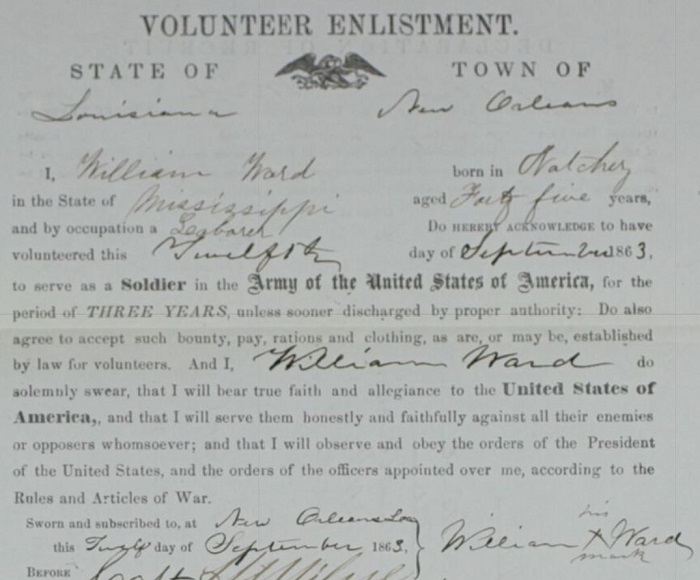

BACKGROUND
The Colfax Massacre is one of the most catastrophic examples of racial violence in the United States, ending in the deaths of at least one hundred and five African American men (perhaps as many as twenty more could not be identified). It is also among the major acts of violence passed over in the larger American historical narrative. In 1873, a contested Louisiana gubernatorial election led to a stand-off between the African American militia of Colfax, Louisiana and local whites seeking to secure the symbolically significant courthouse for the white supremacist regime. The massacre, a horror by itself, became a kind of double tragedy. The death of the community led to a legal battle that proved portentous for the fate of Reconstruction itself. U.S. v. Cruikshank redefined the Fourteenth Amendment out of existence. The high court’s ruling limited federal protective power so that only acts of an individual state, rather than acts of mob violence, warranted governmental action. White violence, in collusion with a conservative American judiciary, nullified constitutional protections and opened a doorway to hell to generations of African Americans.
William Ward and ‘the letter’
Governor Henry Clay Warmoth struggled to maintain political balance in Louisiana. Among his appointments in 1871, he installed William Ward, a black Union veteran, as commanding officer of Company A, 6th Infantry Regiment, Louisiana State Militia, a new unit to be based in Grant Parish to help control the violence there and in other Red River parishes.
The total population of Grant Parish at the time had a narrow majority of 2400 freedmen, who mostly voted Republican, and 2200 whites, who voted as Democrats.
During the ‘Colfax Trial,’ James Roswell Beckwith, prosecuting attorney, decided to call Ward to testify to counter the defense’s claim that the letter Ward wrote, as captain of the states militia, asking the Governor for more troops reflected his desperation, not his aggression.
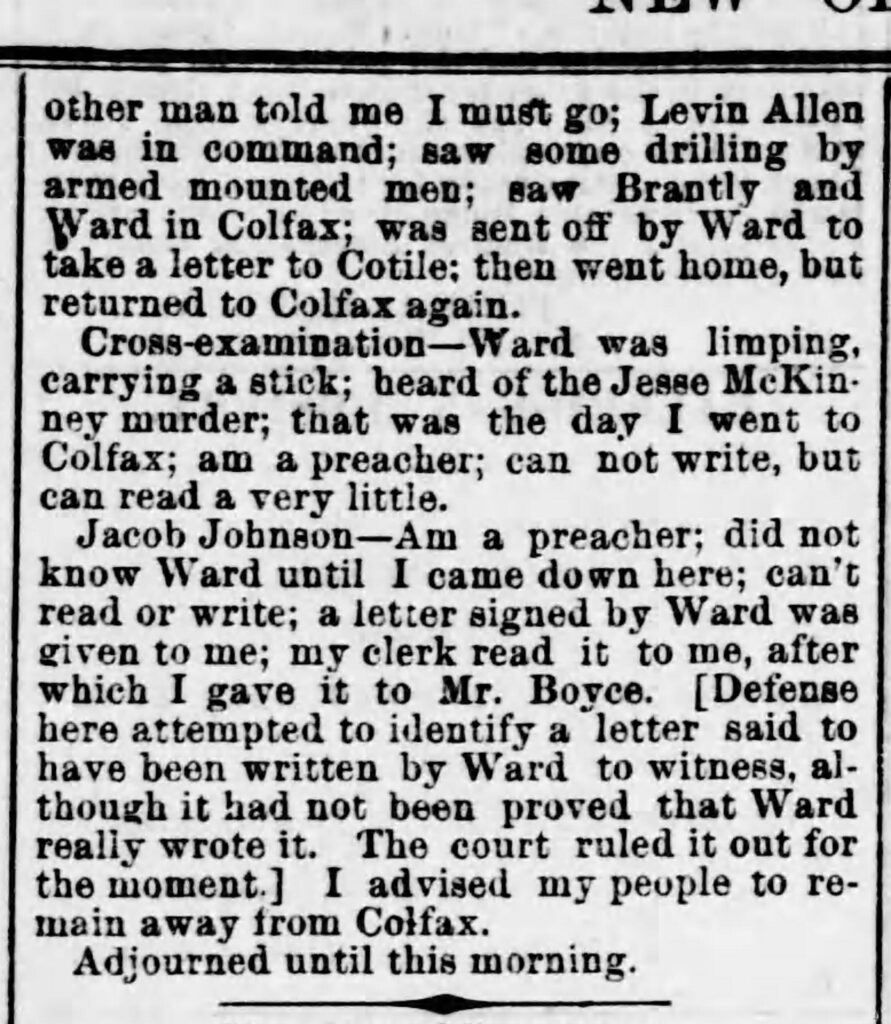
“The defense’s next document…produced (a) letter William Ward has sent to the Negro preacher Jacob Johnson on April 5, 1873, begging him for reinforcements” (p.79, The Day Freedom Died, Charles Lane).
“Ward sat down and wrote a letter to Jacob Johnson, a colored preacher…”

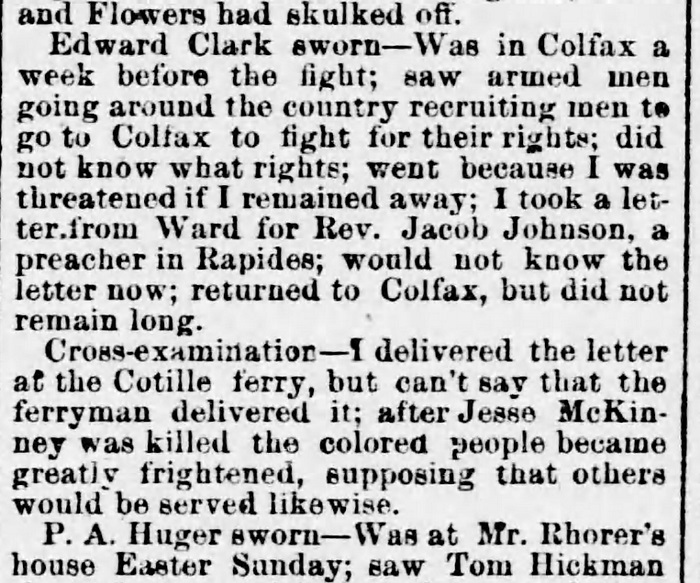
“Dear friend,” Ward began.
“As I Reseve your ancer you Will Du Me and all hour colord Pepel all the helpe in the world at this time hour Pepel are in trouble and I ask you in the name of hour Liberty and hour Children Writes Come to hour Sistence…” (p.79, The Day Freedom Died, Charles Lane).
On the stand, Ward denied any knowledge of the letter. He swore he had been too sick with “rheumatism” to write anything on April 5 and said, “Eli Flowers did all my writing.” Ward’s perjury hurt the credibility of Beckwith’s entire case. The reason is, “if this Negro, a member of the state legislature, would lie under oath, they (the jury) must have thought, what about all the other Negro men and women the prosecution had presented”? (p.177, The Day Freedom Died, Charles Lane).
Note: Research indicates Ward also wrote a letter to Gov. Kellogg on April 7th asking for help and gave it to Willie Calhoun.
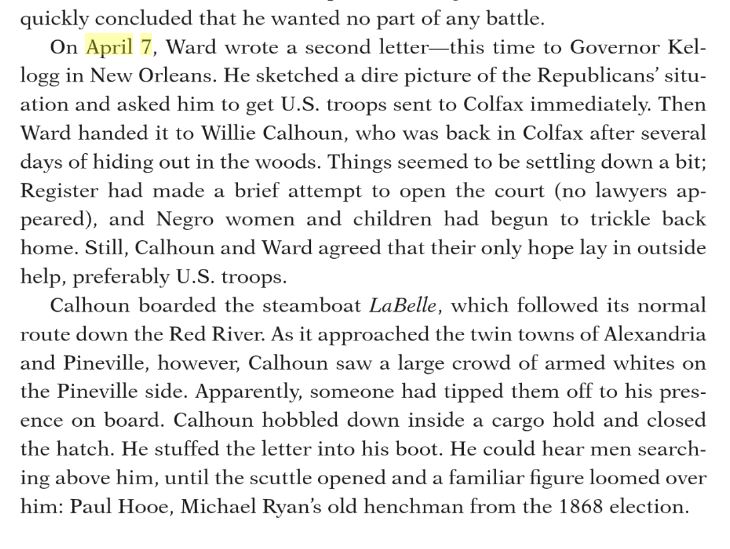
On his way down to New Orleans Willie was stopped by white democrats (Hadnot, Bruikshank) where they found the letter intended for the governor. Apparently unknown by Ward, Ward headed to New Orleans the next day, on April 8th (arriving April 10th), and asked the governor for help. The governor ‘reversed himself’ and decided to send two state militia officers to investigate the situation at Colfax.
Two and a half years later in 1876 William Ward speaks…
“I will tell you about the Grant massacre”
“Now I know better, and do not fear to tell the truth.”

Speeches of William Ward (lead the negro revolt) and Eli Flowers (school teacher)

Ward: “I have been charged with leading a riot in Grant parish and have never had an opportunity fairly, before now, to come out saddle the blame where it properly belongs.”
“I will tell you about the Grant massacre”

“I looked upon the Republican party as one great household family”
“We have endured a terrible government for the past four years, known as Kellogg’s government, which is currupt and rotten as sin.”

“there were two Legislatures sitting in Louisana”

“I said to him: Governor, are not you doing wrong, you are issuing two sets of commissions for the same offices. Now you have two regularly commissioned sheriffs, you have two Judges, two sets of Police Jurors, two Constables; is not that wrong?”

“Kellogg said; “Hold on, Judge, you go up there and settle it, and you can tell Nash to go ahead and I will forward his commission.”
“I did not go up to Colfax for two weeks afterwards, and when I got to Colfax, Mr. Hadnot was there with about twenty men to settle up the differences between the two sets of officers. Dan Shaw, who was the Sheriff first appointed by Mr. Kellogg, came to my house and said there is going to be trouble tomorrow;
I said what for? He said Mr. Hadnot is coming to town here to take possession of the office, and I am going to deputise thirty or forty men to protest the peace.”

“the white people, with Mr. Kellogg’s authority, came into Colfax to take possession of the offices…”
“Mr. Shaw, the Republican Sheriff, summoned all the colored people to resist them.”

“many colored men were killed. It was brought about directly by Kellogg”
“I had no more to do with it than any of you gentlemen”
“Mr. Shaw …said: “You are going to have trouble, what are you going to do?” he said he and Nash were going to have all the colored men summoned to his side.
“Now,” said he, “you are a Republican, and must go down to Kellogg and have him fix the matter up.”
“So I saw Kellogg, and said to him it was all through the two sets of officers that he appointed in Grant parish, which was causing all the trouble”

“All this was on Thursday, and the killing did not take place until Sunday”
“It was their (Kellogg and Packard) purpose to have these seventy-nine colored men killed, for the purpose of gaining the support of the Northern people and sustaining Kellogg as Governor of Louisiana.”
“I OUGHT TO HAVE COME OUT BEFORE, BUT I HELD MY PEACE, BECAUSE THE REPUBLICANS ASKED ME TO DO SO.”

“Now I know better, and do not fear to tell the truth.”

“No more Grant parish massacres will be deliberately planned to fire the Northern heart and the National Congress. If you vote for Gen. Nicholls…”



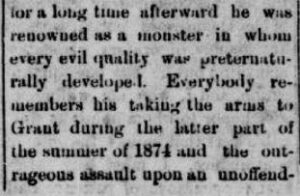


“Let it not be inferred from this that we (Democrats) wish to state or to imply that our committee or any responsible element of the Democratic party has conceived the idea of applying Ward to campaign purposes. We regard his appearance, Tuesday night, as the result of mere thoughtlessness, and are sure that on reflection the Democratic voters…will realize that it is impossible for them to hold any sort of relations with such an utter fiend as Ward. There it but one style of treatment which Ward deserves at the hands of civilization and that is to furnished with a hempen necktie and made to dance on nothing. Even then he would not have expiated the unnumbered and incalcuable crimes with which he is literally saturated.”
